Rising lifestyle shifts, evolving kitchen design trends, and new consumer priorities are transforming not just what types of countertops homeowners choose—but how they care for them. Among these surfaces, quartz has emerged as one of the most in-demand materials, valued for its durability, modern aesthetics, and low-maintenance appeal. As quartz continues to dominate both new builds and remodels, its long-term care and cleaning routines have become a central focus for today’s homeowners.
A recent wave of homeowner surveys and industry insights from kitchen designers shows that quartz countertops—especially in open-concept, high-traffic homes—are now expected to perform far beyond traditional food prep. They’re being used as multifunctional hubs for remote work, homeschooling, crafting, entertaining, and everyday family living. With surfaces now seeing more daily use than ever, cleanliness, sanitation, and long-term surface preservation have become top priorities.
Yet despite quartz’s reputation as a resilient, low-maintenance material, homeowners are becoming increasingly selective about how they clean and protect their investment. Designers report that key considerations now include using products that are not only effective but also non-damaging, safe for engineered stone, environmentally conscious, and aligned with quartz manufacturers’ care guidelines. At the same time, many homeowners are willing to upgrade their cleaning tools and routines—sometimes even spending more—to maintain the sleek, flawless look that makes quartz such a popular choice.
In this guide, we break down exactly how to clean quartz countertops the right way, including daily maintenance cleaning techniques, safe and unsafe cleaners, stain-removal strategies, and pro tips for keeping your quartz surfaces looking brand-new for years.
What You Need to Clean Quartz Countertops
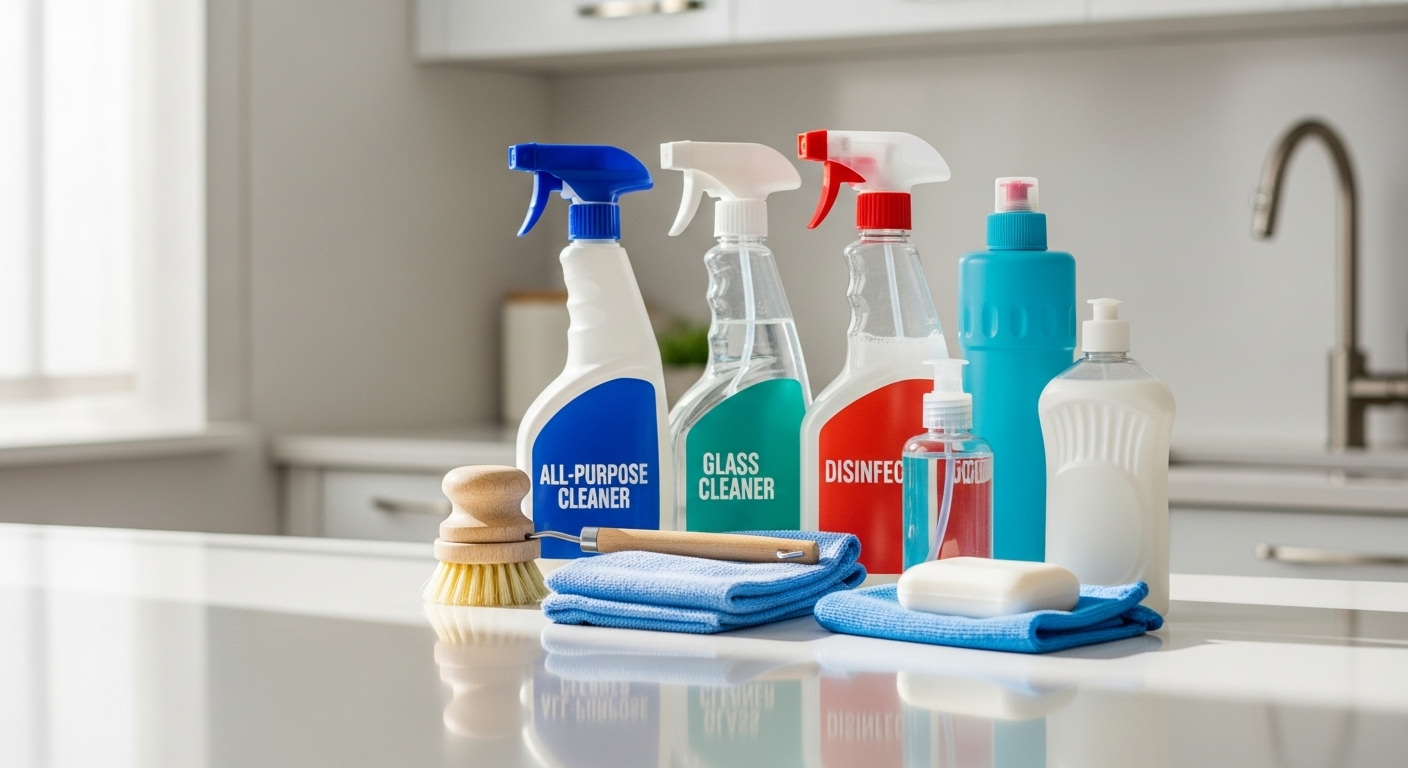
Quartz countertops don’t require specialty chemicals. In fact, most damage comes from using the wrong cleaners, not from lack of cleaning. Below are the only tools and products you actually need, along with why they matter.
Essential Daily-Cleaning Supplies
Maintaining quartz countertops starts with the right daily-cleaning tools and products. Warm water is the simplest and safest option, helping to loosen everyday residue such as food particles, fingerprints, oils, and dust without harming the resin binders in quartz. Pairing warm water with a gentle, pH-balanced dish soap allows you to cut through grease and dirt safely, avoiding acidic or alkaline cleaners that could damage the surface over time.
For wiping and lifting debris, a soft microfiber cloth is ideal, as it cleans effectively without scratching and helps prevent streaking on polished surfaces. A non-abrasive sponge is also useful for gently removing stuck-on residue, but it is important to avoid the abrasive green side commonly found on standard sponges.
For quick cleanups or a streak-free finish, a commercial quartz-safe cleaner can be used. Look for products labeled “quartz-safe,” “stone-safe,” or “non-abrasive surface cleaner”, as these are specifically formulated to protect the engineered stone and maintain the integrity of its resin binders.
Supplies for Tough Stains & Deep Cleaning
1. Isopropyl Alcohol (70% or 91%)
Ideal for disinfecting quartz and lifting oily or stubborn residue. It evaporates quickly and does not damage engineered stone.
2. Non-Abrasive Glass Cleaner
Useful for removing smudges, fingerprints, or water spots. Only use ammonia-free or “non-abrasive” formulas specifically approved for use on quartz.
3. Plastic Scraper
Helps safely remove dried spills like gum, food residue, or paint without scratching the surface.
Cleaners and Tools to Avoid
Certain products can dull, discolor, or degrade the resin binders that make quartz countertops durable. These include vinegar, bleach, oven cleaner, abrasive scrub pads, powdered cleaners, steel wool, and any cleaner labeled as gritty, abrasive, or acidic. Avoiding these products is essential not only to maintain the appearance and integrity of your quartz but also to ensure warranty coverage and long-term durability.
How to Clean Quartz Countertops Step-by-Step
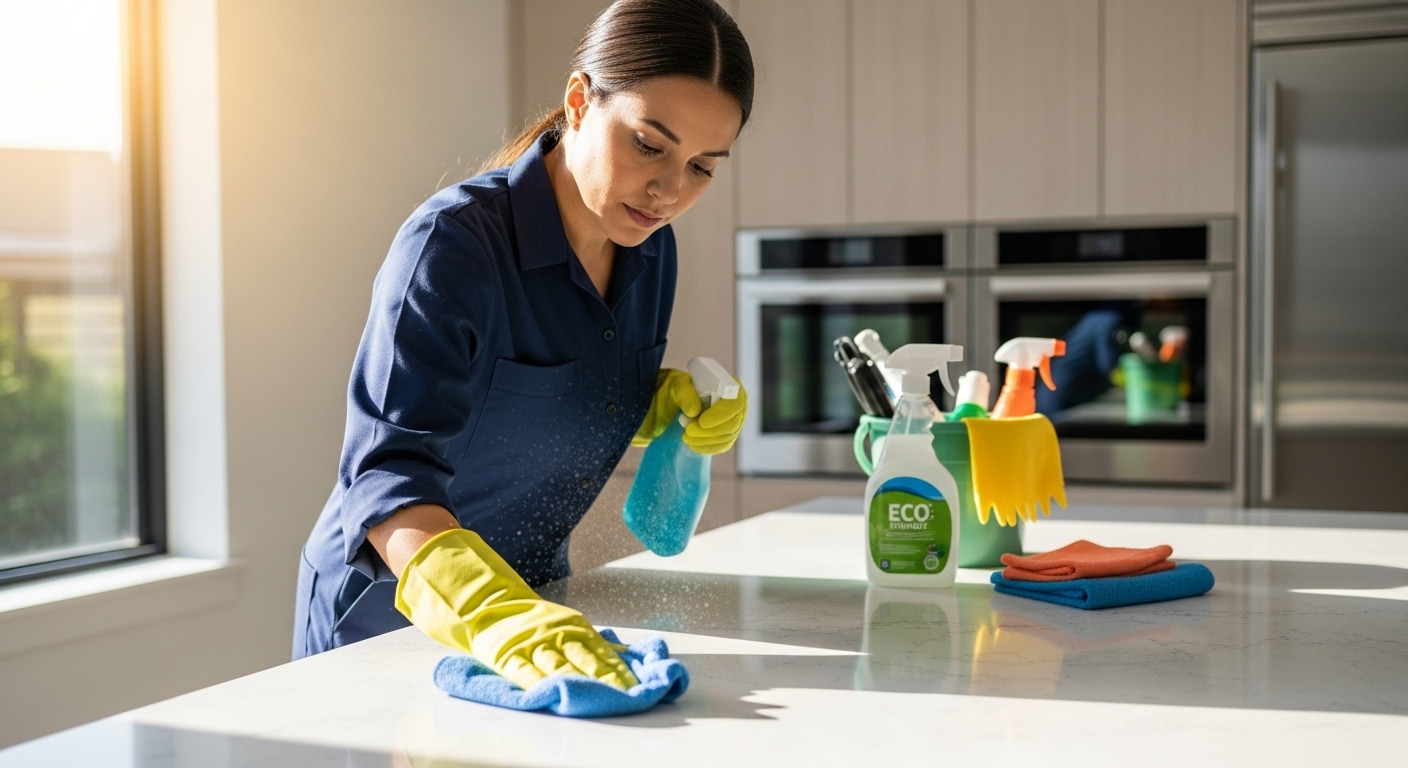
Quartz is durable, but the engineered stone surface requires non-abrasive, pH-balanced cleaning methods to protect the resin binders and polished finish. With Tidy Upped professional cleaning, we implement these steps for safe daily cleaning and residue removal.
1. Remove Surface Debris
Before applying any cleaner, it’s essential to clear your quartz countertop of loose particles. Even small crumbs, dust, or dry food residue can scratch the surface if dragged during wet cleaning.
Steps to follow:
- Take a dry microfiber cloth and gently sweep across the entire countertop. Microfiber is soft and lifts debris effectively without scratching the resin-bound surface.
- For corners or edges, fold the cloth to access tight areas and remove hidden crumbs.
- Avoid paper towels or rough rags for this step. They may push particles around or create micro-abrasions over time.
This initial step ensures that the quartz surface is clean and ready for proper wet cleaning, reducing the risk of scratches and helping maintain the countertop’s smooth, polished finish.
2. Clean with Warm Water + Mild Dish Soap
Daily cleaning is the most important routine for keeping quartz countertops spotless and maintaining their polished finish. Using warm water combined with a mild, pH-neutral dish soap is the safest, most effective method, as it removes everyday oils, spills, and residues without damaging the quartz’s resin binder.
Step-by-Step Instructions:
- Prepare the cleaning solution
- Fill a spray bottle or small bowl with warm water.
- Add 2–3 drops of mild, pH-neutral dish soap and mix gently. Avoid harsh detergents, bleach, or acidic cleaners.
- Dampen your cleaning tool
- Submerge a soft microfiber cloth or non-abrasive sponge in the solution.
- Wring out excess liquid so it’s damp but not dripping.
- Clean the countertop
- Wipe the surface in small circular motions, covering the entire countertop.
- Focus on areas with fingerprints, cooking oils, or minor spills. Circular motions help lift residue without spreading it.
- Rinse thoroughly
- Rinse the cloth with clean water and wipe the countertop again to remove any soapy film. Soap residue can cause streaking or attract dust.
- Dry completely
- Use a dry microfiber cloth to remove remaining moisture and prevent water spots.
- Polished quartz surfaces are especially prone to streaks if left to air-dry, so thorough drying is essential.
Pro Tip: Performing this daily prevents buildup of oils and food particles, reducing the need for stronger cleaners or deep scrubbing later.
3. Remove Grease or Tough Residue
Even though quartz is non-porous, certain spills like oils, sauces, or dried food can cling to the surface. To clean these effectively without damaging the resin layer, follow one of these safe methods.
Option A: Quartz-Safe Degreaser
- Apply the cleaner directly to the affected area. Choose a product labeled quartz-safe or “stone-safe” to prevent surface damage.
- Allow it to sit for 1–2 minutes. This gives the degreaser time to break down oils, sticky residues, or food particles.
- Wipe clean using a soft microfiber cloth, ensuring all residue is removed.
- For larger areas, repeat in sections to avoid leaving cleaner to sit too long on the quartz surface.
Option B: Dish Soap + Warm Water (Stronger Mix)
- Mix a slightly stronger dish-soap solution in warm water. Use more drops of mild, pH-neutral soap than your daily cleaning mix.
- Apply to the stained area and let it sit for 2–3 minutes. This softens dried-on residue without harsh chemicals.
- Wipe using a soft microfiber cloth or non-abrasive sponge, using gentle circular motions to lift residue.
For Stubborn, Dried Residue
- Use a plastic scraper held at a shallow angle to carefully lift stuck-on food, gum, or other debris.
- Never use metal scrapers, knives, or abrasive tools, as they can scratch and damage the quartz’s resin finish.
- After scraping, wipe the area again with clean warm water and dry with a microfiber cloth to remove any leftover residue.
This method removes grease, dried spills, and stubborn stains safely, maintaining both the shine and durability of your quartz countertops while protecting the engineered resin layer.
How to Remove Stains from Quartz Countertops
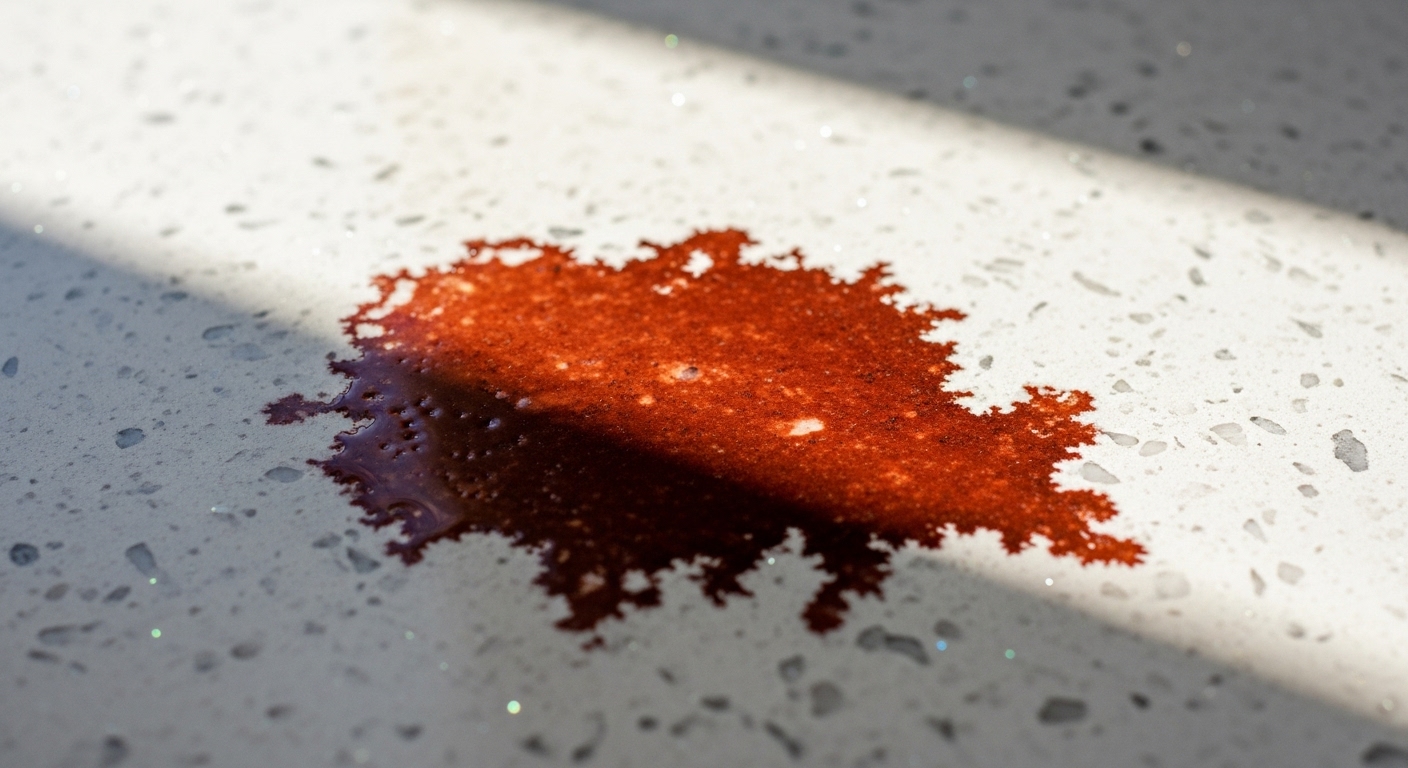
Quartz is non-porous, which means liquids do not penetrate the surface. However, certain substances can dry, harden, or leave a residue that appears as a stain if not cleaned promptly. The most common culprits include coffee and tea, wine, tomato-based sauces, hard water minerals, oils and grease, and food coloring or artificial dyes. Effectively removing stains depends on identifying the type of residue and using the appropriate cleaning method for that specific substance.
1. General Stains (Food, Drinks, Condiments)
General food and beverage stains sit on the surface and can be removed with a non-abrasive glass cleaner or a quartz-approved surface cleaner.
Steps:
- Spray the cleaner directly on the stained area.
- Allow it to sit for 5 minutes so it can break down the residue.
- Wipe using a soft microfiber cloth.
- Rinse with warm water if any film remains.
This method works for coffee, wine, juice, sauces, and most everyday spills.
2. Hard Water Stains
Hard water creates white, chalky spots or rings, often around sinks or faucets. These marks are mineral deposits, not permanent quartz damage.
Use isopropyl alcohol (70%):
Steps:
- Apply the alcohol to a clean cloth.
- Rub the mineral deposit using firm, controlled pressure.
- Rinse with warm water.
- Dry thoroughly to prevent new buildup.
For heavier deposits, you can use a quartz-safe limescale remover.
Do not use vinegar, as its acidity can attack the resin binders in quartz.
3. Oil or Grease Stains
Oils can leave darkened or shiny patches on the surface.
Use either:
- A mild, non-abrasive degreaser, or
- Dish soap (such as Dawn) mixed with warm water
Steps:
- Apply the solution to the stained area.
- Let it sit for 10 minutes to break down the oils.
- Wipe clean with a microfiber cloth.
- Rinse and dry.
4. Dried or Stuck-On Residue
Dried food, paint droplets, or hardened spills require mechanical removal rather than chemical treatment.
Use a plastic scraper:
Steps:
- Hold the scraper at a 45° angle.
- Gently lift the hardened residue.
- Wipe the area with warm water and dish soap afterward.
Never use metal scrapers, razor blades, or anything abrasive, as these can scratch or dull the quartz surface.
How to Disinfect Quartz Countertops
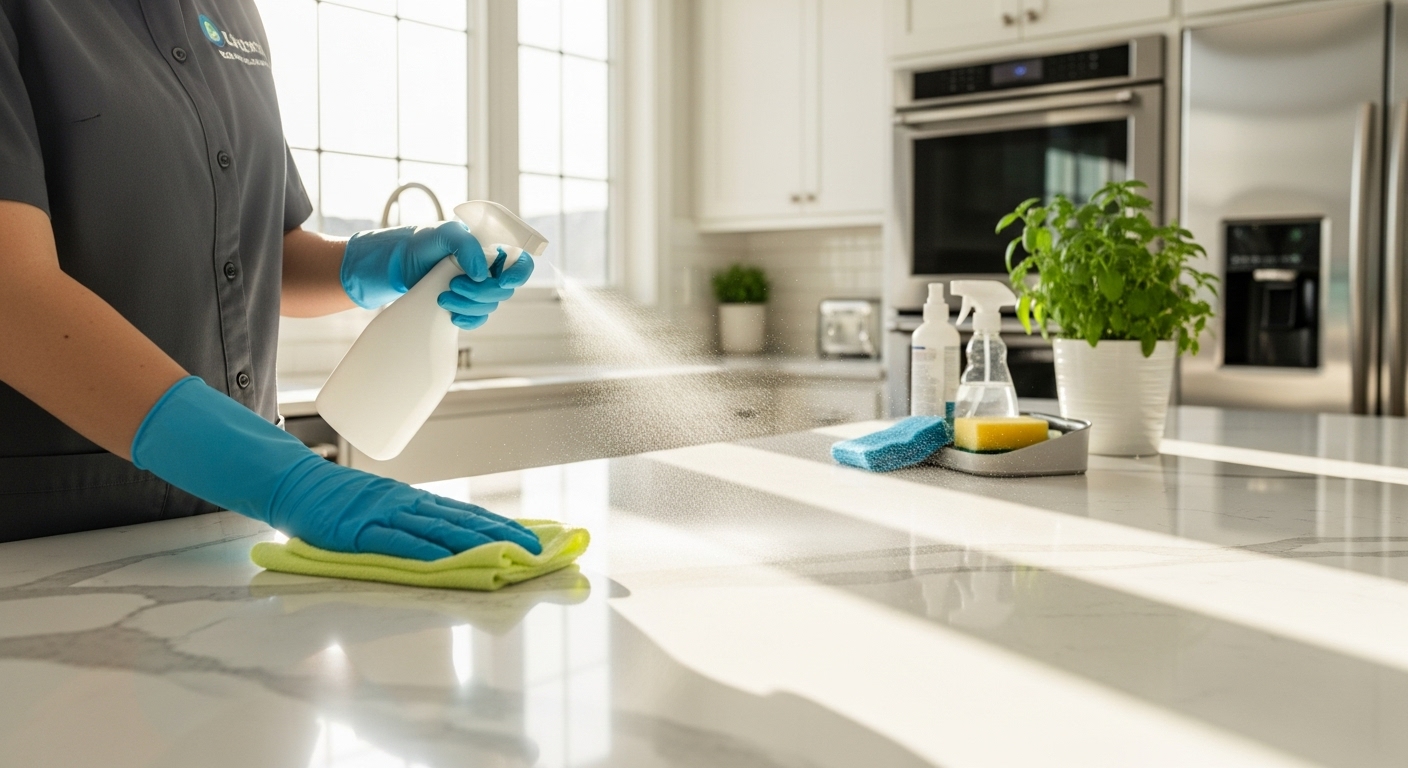
Quartz surfaces are non-porous, which means bacteria and liquids cannot easily penetrate the material. However, disinfection is still recommended after handling raw meat, poultry, seafood, or when cleaning high-touch areas in a busy kitchen.
Below is a safe method that will not damage quartz resin binders or the polished finish.
Safe Quartz Disinfection Method
1. Mix the Disinfecting Solution
To safely disinfect quartz countertops without damaging the surface, start by preparing a simple solution. Combine 70% isopropyl alcohol with water in a 1:1 ratio. This mixture acts as an effective disinfectant that evaporates quickly and does not harm the engineered stone or its resin binders.
2. Apply to the Surface
Once the solution is prepared, lightly spray it over the countertop, making sure to cover the entire area you want to disinfect. Even coverage ensures that all surfaces are properly treated.
3. Allow Dwell Time
After application, allow the solution to sit for 2–3 minutes. This dwell time is necessary to achieve proper microbial reduction and ensure that bacteria or viruses are effectively neutralized.
4. Wipe and Dry
Finally, wipe the countertop with a clean microfiber cloth and dry it completely. Drying prevents streaking and leaves the surface smooth and ready for use, while maintaining the quartz’s polished finish and long-term durability.
Approved Alternatives
You can also disinfect quartz countertops using store-bought quartz-safe sprays or non-abrasive, ammonia-free surface disinfectants that are specifically labeled as safe for engineered stone. When selecting a product, always check the label to ensure it is marked “quartz-safe” or “stone-safe”. Using these approved cleaners helps maintain the integrity of the quartz surface while providing effective disinfection.
Disinfectants to Avoid
Certain cleaning products can damage quartz countertops by breaking down the resin binders, causing discoloration, or dulling the polished finish. These include bleach or chlorine-based products, antibacterial wipes containing strong solvents or acids, and vinegar or any acidic cleaner. In general, any cleaner that is acidic, highly alkaline, abrasive, or labeled as a “degreaser” with harsh solvents is not suitable for quartz. To protect your countertops, avoid these types of products entirely.
How to Keep Quartz Countertops Looking New
Quartz countertops stay in excellent condition when you take simple precautions to protect the surface from scratches, stains, and heat stress. Following proper care habits helps maintain the finish and prevents long-term wear, ensuring your countertops look pristine for years.
1. Use Cutting Boards
One of the most important precautions is to use cutting boards. Avoid cutting directly on quartz surfaces, as knives can leave fine scratches that gradually dull the finish. Cutting boards also protect against metal marks from cookware, utensils, or other kitchen tools. While quartz is durable and resistant to everyday wear, it is not designed to serve as a cutting surface.
2. Wipe Spills Immediately
Another key habit is to wipe up spills immediately. Although quartz is non-porous and resistant to staining, certain substances can leave marks or discoloration if allowed to sit. This is especially true for wine, coffee, tomato sauce, tea, and food dyes or artificial colors. Promptly cleaning spills prevents staining and eliminates the need for stronger cleaners that could damage the surface over time.
3. Avoid Direct Heat
Quartz countertops are heat-resistant, but they still contain resin binders that can be damaged by sudden or prolonged heat exposure. To protect your surfaces, always use trivets or hot pads under hot pots, pans, baking trays, slow cookers, or air fryers. Even minor thermal shock can cause cracks or discoloration, particularly near edges or around appliances, so taking this precaution is essential for maintaining both durability and appearance.
4. Don’t Use Harsh Chemicals
Finally, avoid harsh chemicals when cleaning your quartz countertops. Strong or abrasive cleaners, including heavy-duty degreasers, oven cleaner, paint strippers, drain cleaners, and harsh antibacterial sprays, can break down resin binders, weaken the surface, and create dull areas. Anything labeled acidic, alkaline, or abrasive should also be avoided. Instead, stick to mild dish soap, quartz-safe cleaners, and isopropyl alcohol as needed, ensuring safe and effective cleaning without compromising the integrity of your countertops.
For White Quartz Countertop
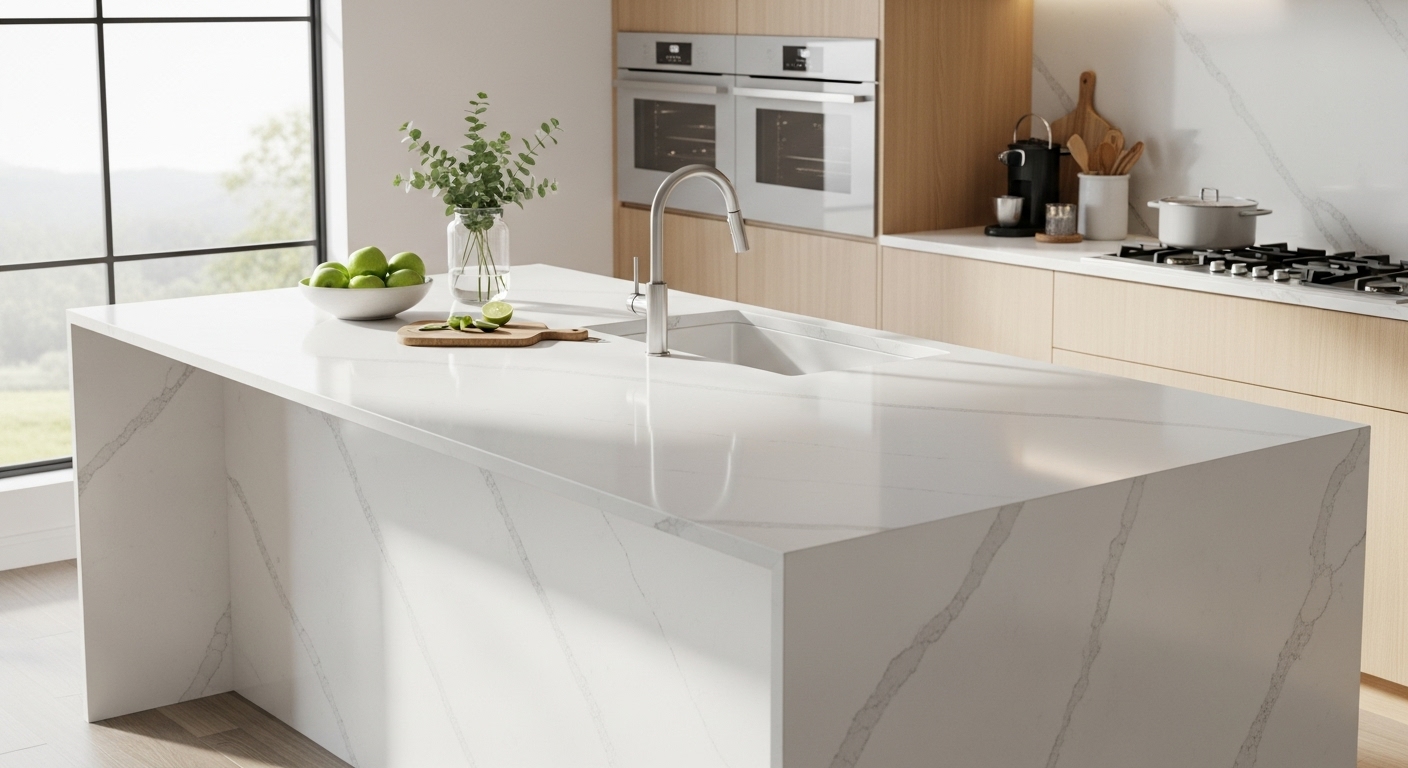
White quartz countertops are particularly prone to showing stains and discoloration, even with everyday use. Because of their light color, spills, smudges, and residue can become more noticeable, making proper cleaning essential.
For removing colored stains or food dyes, a non-abrasive glass cleaner works well to lift the discoloration without damaging the surface. If yellowing or subtle discoloration appears over time, isopropyl alcohol can be used carefully to restore the original brightness of the quartz.
At the same time, it’s important to avoid certain cleaning products. Colored cleaners or sprays can leave behind residue that may be more visible on white surfaces. Magic erasers should also be used sparingly and only on very light marks, as their abrasive nature can dull the polished finish if overused. By following these simple precautions, you can keep white quartz countertops looking fresh and pristine.
Final Tips for Maintaining Quartz Countertops
Keeping quartz countertops looking pristine is straightforward when you follow consistent, safe cleaning products and habits. The key is to use gentle, quartz-safe products and tools, avoid harsh chemicals, and act promptly on spills.
Essential Practices:
- Mild Dish Soap: Use a pH-neutral soap to cut through oils and everyday dirt without harming the quartz resin. Avoid acidic or abrasive cleaners.
- Warm Water: Effective for loosening grime and rinsing soap residue. Warm water also helps prevent streaks when drying.
- Soft Microfiber Cloth: Ideal for wiping and drying surfaces. Microfiber lifts dust and debris without scratching and ensures a streak-free finish.
- Isopropyl Alcohol for Disinfecting: When you need to sanitize after food prep, alcohol is safe for quartz and evaporates quickly without leaving residue.
Pro Tips for Long-Term Care:
- Wipe spills immediately to prevent staining from oils, wine, coffee, or sauces.
- Avoid abrasive scrub pads, steel wool, vinegar, or bleach, which can damage the resin layer.
- Use trivets or hot pads under pots and pans to prevent thermal shock, even though quartz is heat-resistant.
- Incorporate a weekly light cleaning routine with warm water and soap to maintain the polished look and prevent buildup.
By sticking to these simple yet effective habits, your quartz countertops will retain their shine, durability, and aesthetic appeal for years while remaining safe, hygienic, and low-maintenance.

Leave A Comment